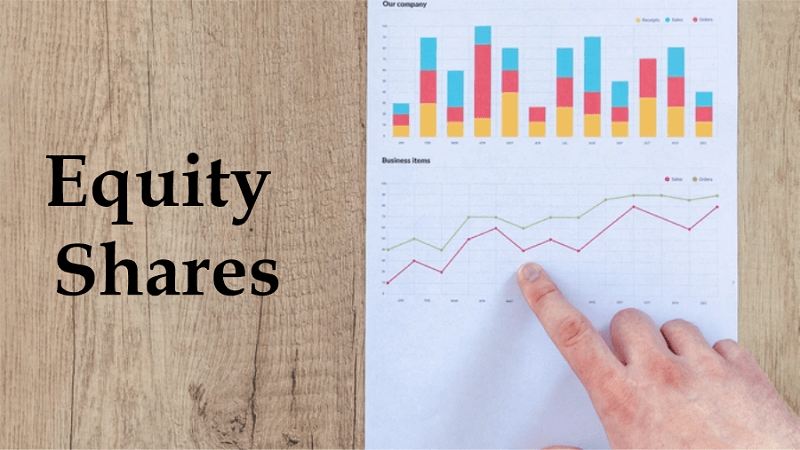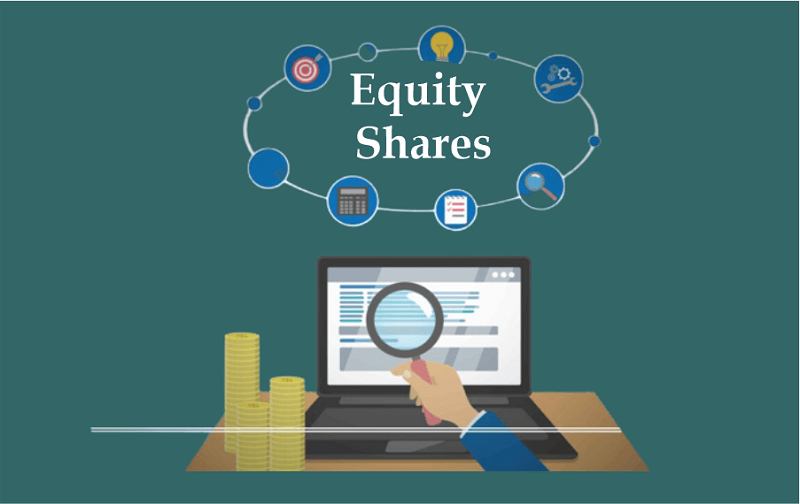Advantages and Disadvantages of Equity SharesEquity Shares were previously referred to as Ordinary Shares. The actual proprietors of the company are the holder of these shares. They hold authority over the company's operations. Companies issue equity shares as a means of raising capital. These non-redeemable shares are made accessible to the general public. The company's profitability determines the dividend rate on these shares. These shareholders are riskier than preference shareholders. Equity shares are used to raise long-term capital. The term "residual owners" is used to describe equity shareholders. They are paid the remaining amount following the resolution of claims against the company's revenue and assets. These shareholders can participate in the firm's management through their voting rights. 
Advantages of Equity SharesDividend and Profits Equity shares usually provide dividends to the shareholders. The company distributes a portion of its earnings to investors and any financial benefit realized by maintaining or selling these assets. Therefore, you must carefully review all the financial accounts to determine how much of a return you will receive when investing in equity shares. Remember that not all businesses pay dividends, so bear that when selecting which stock shares to purchase. Voting Rights One of the clear benefits of equity shares over bonds or mutual funds is the capacity of investors to exercise control. Equity shareholders can vote, allowing them to alter or overturn any decision made at a meeting. Only equity stockholders are eligible to exercise this kind of entitlement. Diversification Due to the variety of types and styles that are currently accessible, diversifying your portfolio is considerably simpler when investing in equity shares. As a result, you'll be able to diversify your risk among various assets rather than a single business or industry. Liquidity Equity shares are liquid, so they can be easily bought & sold on the stock exchange. Limited liability for the investor Indeed, equity owners are not responsible for paying back a company's debts in the event of bankruptcy or insolvency, but this doesn't absolve you of responsibility for your investment choices. Always choose businesses whose potential for growth outweighs their risks, and be prepared to lose money on your investment. Right shares Companies frequently issue "rights shares" when they need more funding for expansion. By issuing these shares, the investor gains investment preference over other investors while preserving ownership and control of the current shareholders. Right Shares are issued for less money than the equity share's current market value. To obtain the value of a right, an existing investor might use that advantage or relinquish it in someone else's favor. Bonus shares Companies may opt to give their shareholders bonus shares. It is a different kind of dividend. Existing shareholders may get free bonus shares instead of dividends. 
Disadvantages of Equity SharesDividend A shareholder's dividend payment is neither set nor subject to investor control. The amount of the dividend is decided by the company's management. A dividend is guaranteed in the event of a loss. Investors will get a dividend if there is a profit once the board of directors suggests one. High Risk Investing in equity shares is riskier than other investments, such as loans. Funding decisions are made based on an investor's trust in the business. Any collateral does not secure it. Such shares hold no interest for investors seeking safe, fixed-income investments. Price fluctuations in the market Any equity share's market price might vary enormously. Booking market profits is always challenging. On the other hand, the chances of losing are equal. Limited control As a small shareholder in the firm, an equity investor has little opportunity to use their voting rights to influence the company's policies. If you stop investing, you lose your ownership interest in the firm. A shareholder will stop getting dividends if they cannot keep purchasing equity shares for whatever reason, such as financial constraints or personal issues. These investors may eventually be forced to sell their assets. Investors may suffer significant losses if this occurs before a liquidity event (like an IPO). Loss of investment You might lose money if you invested in an equity share. This occurs when shareholders are compelled to sell their shares before they can find a buyer, meaning whoever purchased those shares would then possess a portion of the company and be eligible to receive the assets. If this occurs, you risk losing your money and any future dividend payments and profit-sharing from the company. The ConclusionMany people utilize equity shares as an investment to improve their financial security. Purchasing equity shares may have various advantages and downsides depending on your circumstances. Therefore, it's crucial to consider equity shares' advantages and disadvantages before choosing this stock investing style.
Next TopicAdvantages and Disadvantages of Zoos
|
 For Videos Join Our Youtube Channel: Join Now
For Videos Join Our Youtube Channel: Join Now
Feedback
- Send your Feedback to [email protected]
Help Others, Please Share










